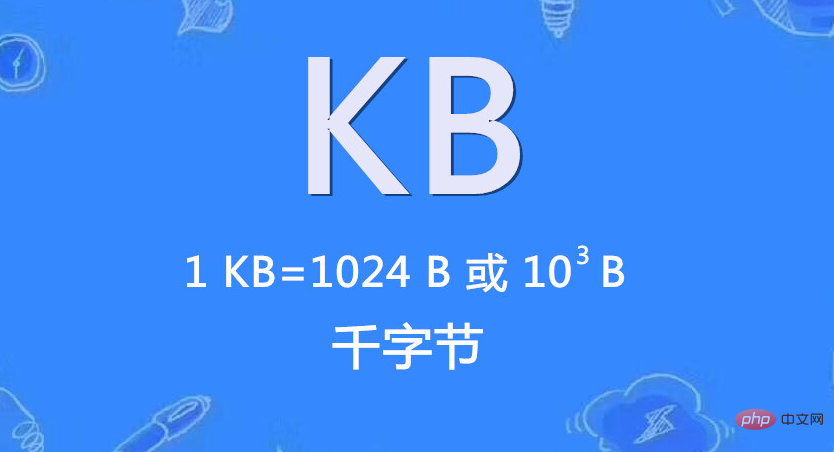How many bytes are equal to 1kb in computer?
In computers, 1kb is equal to 1024 bytes. kB refers to kilobytes, which is a unit of information measurement and is a multiple of the computer data storage unit byte; according to the IEC naming standard, 1kB = 1024B (byte). Byte is a unit of measurement used by computer information technology to measure storage capacity. It also represents data types and language characters in some computer programming languages. One byte stores an 8-bit unsigned number.

#The operating environment of this article: windows10 system, thinkpad t480 computer.
KB (kilobyte (unit of measurement))
kB (Kilobyte) is an information measurement unit and is the storage unit of computer data memory in bytes Multiple forms of . Nowadays, it is usually used to identify the storage capacity of storage media with general capacity such as memory.
According to the IEC naming standard, the standard naming for binary storage units is KiB, MiB, etc., 1kiB = 1024B. This is determined by the binary storage method of the data stream.
Linux and macOS X use the International System of Units standard naming. However, systems below Windows xp still incorrectly label KiB as KB. Confusion has become common because systems still record data capacity in the old way, usually Kilobyte can also refer to Kibibyte, that is, 1KB = 1024B.

Byte
Byte is a unit of measurement used by computer information technology to measure storage capacity. It is also Represents data types and language characters in some computer programming languages.
One byte stores an 8-bit unsigned number, and the stored value range is 0-255. Like characters, byte type variables only require one byte (8 bits) of memory space to store.
Byte is the unit of binary data. A byte is usually 8 bits long. However, some older computer architectures use different lengths. To avoid confusion, in most international literature the word byte is used instead of byte. In most computer systems, a byte is an 8-bit unit of data. Most computers use a byte to represent a character, number, or other character. A byte can also represent a series of binary bits. In some computer systems, 4 bytes represent a word, which is the unit of data that the computer can efficiently process when executing instructions. Some language descriptions require 2 bytes to represent a character, which is called a double-byte character set. Some processors are capable of handling double-byte or single-byte instructions. Bytes are often abbreviated as "B" and bits are often abbreviated as a lowercase "b". The size of computer memory is usually expressed in bytes.
Related units:
B and bit
Data storage is in "byte" (Byte), and data transmission is mostly in " "Bit" (also known as "bit") is the unit. One bit represents a 0 or 1 (that is, binary). Every 8 bits (bit, abbreviated as b) constitute a byte (Byte, abbreviated as B). It is the smallest level of information unit.
Word
In a computer, a string of numbers that are processed or calculated as a whole is called a computer word, or word for short. Words are usually divided into bytes (each byte is usually 8 bits). In memory, each cell typically stores one word. Therefore each word is addressable. The length of a word is expressed in bits.
Word length
The number of bits contained in each word of a computer is called the word length. The calculated word length refers to the number of binary digits it can process at one time. Generally, the word length of large computers is 32-64 bits, that of small computers is 12-32 bits, and that of microcomputers is 4-16 bits. Word length is an important factor in measuring computer performance.
(Learning video sharing: Programming video)
The above is the detailed content of How many bytes are equal to 1kb in computer?. For more information, please follow other related articles on the PHP Chinese website!

Hot AI Tools

Undresser.AI Undress
AI-powered app for creating realistic nude photos

AI Clothes Remover
Online AI tool for removing clothes from photos.

Undress AI Tool
Undress images for free

Clothoff.io
AI clothes remover

Video Face Swap
Swap faces in any video effortlessly with our completely free AI face swap tool!

Hot Article

Hot Tools

Notepad++7.3.1
Easy-to-use and free code editor

SublimeText3 Chinese version
Chinese version, very easy to use

Zend Studio 13.0.1
Powerful PHP integrated development environment

Dreamweaver CS6
Visual web development tools

SublimeText3 Mac version
God-level code editing software (SublimeText3)

Hot Topics
 1387
1387
 52
52
 Remote Desktop cannot authenticate the remote computer's identity
Feb 29, 2024 pm 12:30 PM
Remote Desktop cannot authenticate the remote computer's identity
Feb 29, 2024 pm 12:30 PM
Windows Remote Desktop Service allows users to access computers remotely, which is very convenient for people who need to work remotely. However, problems can be encountered when users cannot connect to the remote computer or when Remote Desktop cannot authenticate the computer's identity. This may be caused by network connection issues or certificate verification failure. In this case, the user may need to check the network connection, ensure that the remote computer is online, and try to reconnect. Also, ensuring that the remote computer's authentication options are configured correctly is key to resolving the issue. Such problems with Windows Remote Desktop Services can usually be resolved by carefully checking and adjusting settings. Remote Desktop cannot verify the identity of the remote computer due to a time or date difference. Please make sure your calculations
 2024 CSRankings National Computer Science Rankings Released! CMU dominates the list, MIT falls out of the top 5
Mar 25, 2024 pm 06:01 PM
2024 CSRankings National Computer Science Rankings Released! CMU dominates the list, MIT falls out of the top 5
Mar 25, 2024 pm 06:01 PM
The 2024CSRankings National Computer Science Major Rankings have just been released! This year, in the ranking of the best CS universities in the United States, Carnegie Mellon University (CMU) ranks among the best in the country and in the field of CS, while the University of Illinois at Urbana-Champaign (UIUC) has been ranked second for six consecutive years. Georgia Tech ranked third. Then, Stanford University, University of California at San Diego, University of Michigan, and University of Washington tied for fourth place in the world. It is worth noting that MIT's ranking fell and fell out of the top five. CSRankings is a global university ranking project in the field of computer science initiated by Professor Emery Berger of the School of Computer and Information Sciences at the University of Massachusetts Amherst. The ranking is based on objective
 What is e in computer
Aug 31, 2023 am 09:36 AM
What is e in computer
Aug 31, 2023 am 09:36 AM
The "e" of computer is the scientific notation symbol. The letter "e" is used as the exponent separator in scientific notation, which means "multiplied to the power of 10". In scientific notation, a number is usually written as M × 10^E, where M is a number between 1 and 10 and E represents the exponent.
 What does computer cu mean?
Aug 15, 2023 am 09:58 AM
What does computer cu mean?
Aug 15, 2023 am 09:58 AM
The meaning of cu in a computer depends on the context: 1. Control Unit, in the central processor of a computer, CU is the component responsible for coordinating and controlling the entire computing process; 2. Compute Unit, in a graphics processor or other accelerated processor, CU is the basic unit for processing parallel computing tasks.
 Unable to open the Group Policy object on this computer
Feb 07, 2024 pm 02:00 PM
Unable to open the Group Policy object on this computer
Feb 07, 2024 pm 02:00 PM
Occasionally, the operating system may malfunction when using a computer. The problem I encountered today was that when accessing gpedit.msc, the system prompted that the Group Policy object could not be opened because the correct permissions may be lacking. The Group Policy object on this computer could not be opened. Solution: 1. When accessing gpedit.msc, the system prompts that the Group Policy object on this computer cannot be opened because of lack of permissions. Details: The system cannot locate the path specified. 2. After the user clicks the close button, the following error window pops up. 3. Check the log records immediately and combine the recorded information to find that the problem lies in the C:\Windows\System32\GroupPolicy\Machine\registry.pol file
 How many bytes does an ascii code occupy?
Sep 07, 2023 pm 04:03 PM
How many bytes does an ascii code occupy?
Sep 07, 2023 pm 04:03 PM
An ASCII code occupies one byte. ASCII code is a coding standard used to represent characters. It uses 7-bit binary numbers to represent 128 different characters, including letters, numbers, punctuation marks, special characters, etc. A byte is the basic unit of computer storage unit. It consists of 8 binary bits. Each binary bit can be 0 or 1. One byte can represent 256 different values, so it can represent all characters in the ASCII code.
 Detailed explanation of the method of converting int type to bytes in PHP
Mar 06, 2024 pm 06:18 PM
Detailed explanation of the method of converting int type to bytes in PHP
Mar 06, 2024 pm 06:18 PM
Detailed explanation of the method of converting int type to byte in PHP In PHP, we often need to convert the integer type (int) to the byte (Byte) type, such as when dealing with network data transmission, file processing, or encryption algorithms. This article will introduce in detail how to convert the int type to the byte type and provide specific code examples. 1. The relationship between int type and byte In the computer field, the basic data type int represents an integer, while byte (Byte) is a computer storage unit, usually 8-bit binary data
 Python script to log out of computer
Sep 05, 2023 am 08:37 AM
Python script to log out of computer
Sep 05, 2023 am 08:37 AM
In today's digital age, automation plays a vital role in streamlining and simplifying various tasks. One of these tasks is to log off the computer, which is usually done manually by selecting the logout option from the operating system's user interface. But what if we could automate this process using a Python script? In this blog post, we'll explore how to create a Python script that can log off your computer with just a few lines of code. In this article, we'll walk through the step-by-step process of creating a Python script for logging out of your computer. We'll cover the necessary prerequisites, discuss different ways to log out programmatically, and provide a step-by-step guide to writing the script. Additionally, we will address platform-specific considerations and highlight best practices



